- Home
- Joy Dettman
Ripples on a Pond Page 8
Ripples on a Pond Read online
Page 8
Cigarettes were expensive, but cheaper by the carton. Bought three cartons.
She’d picked up Georgie’s book. It was big, more coffee table size than bookshelf size. It lived on her coffee table. She’d unwrapped it, hadn’t opened it. When March was over, she’d open it. She glanced at it when she turned on her television.
Its creators’ names were on the cover: J. Hooper, J. McPherson. The publisher’s name was there too, and she knew that publisher. They were the first she’d tried with Rusty. She’d had high hopes for Rusty, but they’d sent it back; and knowing that they hadn’t sent Jim Hooper’s book back hurt.
Everything hurt. Cute kids in old films hurt – a poor little rich girl who didn’t believe in Santa. She’d watched it before. Sat down to watch it again.
She’d believed in Santa until she was nine years old; until Sarah North, who’d lived over the road in Sydney, had told her who it really was who crept in at night and placed the presents under the Christmas tree. She hadn’t believed Sarah, and on Christmas Day had asked Pete, her cousin. He’d known all about the man in red, had big brothers to tell him. When he’d giggled because she still believed, she’d giggled with him and felt like the greatest fool on earth.
She’d got over it. She’d get over this too.
Her flat was stocked to the rafters. She’d built a pyramid of canned supplies in the corner of her bedroom. Preserved peaches and beetroot at its foundation, smaller squat cans of stew and curry, supporting the slimmer cans of soups and Carnation milk – stable enough as long as she didn’t knock it, as long as she didn’t want a can of peaches. Hadn’t thought about that while she’d been building.
Tiny tins of ham and salmon in the refrigerator. Pantry shelf bowing beneath its load of dry staples. Bottles of Coke and bubbly wine standing alongside the wall beside her fridge; typing paper piled on her desk, spare ribbons in her desk drawer.
Fresh fruit she’d miss. Even the greenest bananas only lasted for a day or two in summer. Granny Smith apples lasted longer. She’d survive.
THE CENTENARY
The town was lit up like a Christmas tree, coloured lights strung around every shop veranda. A few of the council wits had saved the red lights to decorate the police station and early that morning a professionally painted sign advertising BORDELLO had been fixed to the front gate. It had raised a few laughs before the constable’s kids noticed it. Too good to waste, they’d fixed it over the bank’s door.
There were half a dozen extra cops in town – and Jack Thompson, though he wasn’t in uniform tonight. Georgie had seen him earlier, queuing to buy fairy floss. She knew he had a son. She’d seen the birth notice in the paper back in the early sixties.
For the past week the council grader had been at work in the railway paddock, raising dust while doing what it could to turn it into car park – or to turn the north side of it into a car park, complete with attendants tonight. A carousel for the kids, the fairy-floss van, hot doughnut van and a drinks and ice-cream van had been parked in a row on the south side of the railway paddock, easily accessible from South Street, where most of the action was.
The weather had been kind, the night warm but not hot. No wind, thank God. Two days ago there’d been wind enough to knock over a handful of the street pot plants and send them rolling down the road. They were back where they belonged, bruised, a few wilted. They only had to make it through to midnight.
The planning committee had expected to get a crowd and got more than they’d expected. They’d had to put the concert on last night for the locals or there would have been no seats to sell tonight to the visitors. There was standing room only at the hotel; Freddy Bowen, the publican, and his wife had been running around like chooks with their heads cut off since early evening, their dining room and beer garden the only places in town to get a sit-down meal.
Seating was available if you bought a cup of tea and a cake from the CWA ladies, who had set up trestle tables and stools on the station platform. They were doing a roaring trade. As was the hot doughnut van, and why not? Hot grease was tasty – and those doughnuts smelled like Jenny’s fried dough balls. Georgie joined his queue. Ten minutes later, a hot brown paper bag in hand, she walked on towards Charlie’s corner, eating grease and scalding jam.
Three girls from the hippy commune had a stall beneath Charlie’s veranda. One made tie-dyed silk scarves. Georgie wasn’t into scarves, but with time to fill she walked down to have a look.
Trudy was there, looking at their necklaces and decorated hair combs. Elsie, Harry and Teddy Hall stood nearby, keeping an eye on Trudy while talking to one of the stallholders. Teddy turned as Georgie offered her doughnuts.
He helped himself to one. ‘Back me up,’ Teddy said. ‘How long did it take us to walk home from Monk’s that day?’
‘I couldn’t afford a watch in those day,’ Georgie said.
‘Monk’s is less than half an hour from Georgie’s place – as the crow flies,’ Teddy told the stallholder.
Bush kids, like crows, learn to draw direct lines. Teddy Hall had learnt earlier than most. He’d spent a lot of his early years leaving home.
Georgie would have been eleven, going on for twelve, the Christmas Day Ray King had turned up on his bike with Raelene and Donny. They might have been there for a week the day Teddy had shown her two inner tubes and told her he was going to rope them together and float down the creek to some place and never come back. It had sounded like a good idea at the time.
They’d done it one Saturday morning. She’d supplied plums, peaches and two corned-beef sandwiches. Teddy had supplied two rabbit traps, rope and Lenny’s bike pump, and away they’d gone, on their two-truck-tyre raft, their supplies, shoes and clothes in a hessian bag and with an oar that had started life as a strip of leftover three-ply and the handle of Elsie’s worn-out straw broom.
Had the creek been higher, the current running faster, had it followed the crow’s flight they may have gone further. Georgie had been convinced they’d travelled fifty miles of twists and turns when Teddy recognised Monk’s house. It had taken them too long to get to nowhere and she’d been burnt to a crisp. They’d rowed to shore, opposite Monk’s, deflated their craft, eaten their damp corned-beef sandwiches, then she’d followed Teddy into the bush, eating peaches and plums and leaving a trail of seeds as Hansel and Gretel had left a trail of breadcrumbs, Georgie, dead certain that Teddy hadn’t had a clue where he was leading her.
He had, and one of those seeds had taken root. It produced plums too. Teddy had brought a handful into the shop two weeks ago and they’d laughed again about their aborted escape.
A stranger interrupted her thoughts. ‘If you’re not Georgie Morrison, I’ll eat my hat.’
‘That’s the trouble with red hair,’ Georgie said.
‘Mary Willis,’ the woman introduced herself, then turned to identify Teddy. He was almost two years Georgie’s senior but had gone through primary school with her.
‘I can’t pick you,’ Mary Willis said.
‘I doubt you’d want to,’ he said. ‘I’m one of Harry Hall’s half-breeds.’
Bloody stirrer, Georgie thought and stepped across the gutter to the road.
She’d met a few tonight who had called her a bastard in grade one but now claimed her as a long-lost friend. She’d done her bit. Railroaded by Jenny into wearing a ‘hostess’ badge, she was counting down the minutes to nine when her shift ended and the adults’ concert began. A row of seats had been reserved for the hostesses.
Amy and John McPherson had organised a lot of concerts in their time, schoolkids’ and adults’. Georgie had been in a few – in the school choir one year. She couldn’t hold a tune to save her life but Margot could. Wouldn’t though, not unless Georgie had stood at her side.
She wasn’t in here tonight. Elsie had tried to get her out of the house. Georgie had told her that she was going and that’s all there was to it. Wasted effort. Most was with Margot. Margot had expected Elsie to give in and stay home w
ith her. Georgie had half-expected it. She hadn’t. Every one of her kids was in town tonight – seven of them, plus three wives, two husbands and umpteen kids, and Joey, who had flown down from Queensland.
Georgie looked at her watch and it was close enough to nine for her. She removed her badge and walked across the road to the town hall where a crowd queued to get in. A second shorter queue waited to buy one of Jim and John’s books. The Willama bookshop owner had set up his stall in the foyer – Jim and John were seated behind a trestle table, pens at the ready to sign what he sold.
Expensive books, considered by many to be worth the money; the bookseller had started the night with two dozen cartons stacked behind the table. He was currently battling the crowd to haul in more. Georgie was watching him, hoping he didn’t drop a carton on someone’s head, when she felt another tap on the shoulder.
Look, no badge, she thought, then recognised Katie and Tom Thompson.
‘If it isn’t my second favourite redhead,’ the old chap said. Katie’s frizzy hair was as red as it had ever been, if not as abundant. A kissy pair, Georgie copped two, but copped them sweet. She’d liked Jack’s parents when she’d met them in ’59. For a time she’d considered marrying him for his parents. They were what she’d considered to be normal, back when her life had seemed too far outside the range of normal. They owned a hotel in Molliston, sixty or seventy miles east of Woody Creek.
‘What are you doing in my neck of the woods?’ Georgie asked.
‘Jack brought us up. He’s here somewhere with his family,’ Katie said.
‘I spotted him earlier buying fairy floss,’ Georgie admitted, didn’t add that she’d changed her mind about buying a stick of the spun sugar. Good memories of the one Willama show she’d been to as a kid lived on in the taste of pink fairy floss – and celluloid kewpie dolls clad in frilly tulle.
‘Have you got tickets?’
‘Jack and Dianne have got them,’ Katie said. ‘We’re holding their places. What a crowd.’
‘It’s bigger than everyone expected,’ Georgie said, glancing at Tom’s walking stick. They’d been elderly in ’59. They had to be well into their eighties. Her own feet were looking forward to sitting down, as theirs must have been.
‘We heard your mum singing at a talent quest once, way, way back in the thirties,’ Tom said.
‘She’s still good,’ Georgie started, then sighted Jack approaching with a plump blonde woman and two skinny-necked boys. She patted Katie’s shoulder, then told a partial lie. ‘I told Jenny I’d plaster a bit of makeup on her face. I’d better go.’ She’d plastered on the makeup an hour ago. ‘Good to see you,’ she said, and merged into the crowd.
Most of her merged. Her hair wasn’t easy to hide. She’d stopped growing at five foot ten but usually added three or four inches to her height with heels. She was wearing sandals with three-inch heels tonight, the lesser inch a concession to the time she’d be standing in them.
Walked around the corner, where she stopped to light a cigarette before continuing down to the side door to wait for its bolts to be drawn. They’d bring the kids out that way to escape the crowd, and when they did, she’d sneak in.
Heard the last of the tinkling kids’ voices singing ‘Train Whistle Blowing’. Every item tonight, plus the costumes, had been chosen to fit into the theme of the old days.
Jenny was wearing Juliana Conti’s gold crepe frock they’d dug out from the bottom of Granny’s cedar trunk, an authentic 1920s frock. She’d restrung Granny’s amber necklace and bought fake amber earrings, almost a match.
I should be thinking about tomorrow, not yesterday, Georgie thought. Maybe she would if she ever worked out what she wanted to do with her tomorrows.
Cara would be seeing in the new year in London – in twelve hours or so. She’d be home in April.
Sell the shop and move down to the city, share a flat with her. She’d be easier to live with than Margot.
Or fly somewhere, see a bit of the world. Or drive somewhere.
Margot.
She was the brake on Georgie’s life, like the barricades the council blokes had used to block off both ends of South Street, big sign on them: No Through Traffic.
And the door was opening and kids streaming out.
Jenny opened the adult’s concert with ‘Yesterday’.
THE FUGITIVE
Cara had survived the week between Christmas and New Year, locked inside her dogbox; maybe the longest, loneliest, saddest week of her life. On New Year’s Eve, stir crazy, 1970 still an hour away, she opened a bottle of wine, and lifted a glass to Morrie, knowing that he was doing the same on the far side of the ocean – or would be.
She’d met him at a New Year’s Eve dance in Ballarat, in 1964. Five years ago. She’d been in love with him for most of those five years. Why hadn’t he told her he’d been born in Australia? Why hadn’t she asked where he’d been born?
Why hadn’t he told her his mother was Australian? He’d rarely mentioned his mother – other than her illness. I’ve served my time here, he’d once said, and that was all he’d said.
He’d known Melbourne roads. She should have wondered how he’d known them so well. When she’d told him she’d won Armadale Primary in the Education Department’s lottery, he’d repeated the name, but hadn’t told her he’d started his schooling there. Why hadn’t he said something then?
Because Morrie Langdon hadn’t attended that school. The school’s old records only mentioned James Morrison King; and Morrie had been hiding who he was from himself, not from her.
The wine was good. Bubbly wine always went directly to her head. And maybe to her stomach.
Whatever was in there was having its own New Year’s party. Maybe it was two. And why not? People needed people. Tonight, she needed people.
Outside her window, Melbourne was partying. In Woody Creek, Georgie would be partying. She lifted her glass to Georgie and to Woody Creek’s centenary, to its new paint, its flowerbeds and its white ants.
To date, her belly bulge hadn’t moved much; and when it had, it had felt like wind rolling in her intestines. She knew they moved. Cathy had spoken about Timothy practising football inside her.
Rosemary in Rosemary’s Baby had fought to know her child, fathered by the devil, and when she’d finally seen it, she’d loved it. No devil in Cara’s: a double dose of Jenny, but Jim Hooper and Billy-Bob someone were mixed up in there too. It could be normal.
After the bottles of wine she’d drunk? After the pills she’d swallowed?
Heroin addicts gave birth to addicted babies, but they were still babies. Wine came from grapes. Not the wine she could afford to drink. It probably came from chemicals. Nice chemicals. She filled her glass again; it was beginning to hit the spot she required it to hit.
She poured a third glass before attempting to drag the coffee table nearer to her chair – and spilled wine all over the cover of J. Hooper and J. McPherson’s too big, too shiny, too perfect book with its little old hut on the cover. Got the hut’s roof wet. The wine ran off when she upended the book. Shook it, wiped it with her hand, then with the hem of her dressing-gown. Had to open it, only to see if any wine had leaked inside.
Found a portrait of some antique old coot with a goatee beard: James Richard Hooper. Flipped the page to a shot of forty-odd old-fashioned people. Lots of names beneath, though not forty-odd. Kept turning pages until she came to a photograph of a bride and groom, a pretty, dark-headed bride and a pretty-boy groom – with Cara’s hair, and almost the same style. No need to read his name; knew she was looking at Georgie’s Itchy-foot. The name was beneath the photograph: Gertrude and Archibald Foote, September 1888.
Georgie’s midwife granny, a young, unsmiling bride. She’d known that weddings were nothing to smile about – or had found out soon enough. Left Archibald Foote after eight years. Cara lifted her glass to her unknown grandmother, who wasn’t her blood grandmother anyway. Lifted it again to the memory of the grandmother she’d been allowed to
believe was her grandmother – old misery-guts, carping, demanding Gran Norris.
Morrie was blood. Georgie was blood. That baby-dumping bitch was blood, and Margot, and that was all.
Turning pages, seeking colour. She searched the entire book and found none. Flipped to a bullock team hauling a massive log. Flipped by army uniforms, family groups; flipped to the back cover and photographs of J. Hooper and J. McPherson, brief biographies beside them. Learned that James Hooper was the great-grandson of James Richard Hooper. He didn’t look like the bearded old coot. He looked like a writer of history books: long-jawed, dark-rimmed glasses, underfed.
Raised her empty glass to a fellow writer, then turned back – to stop her fingers at a poem beneath a photograph of an old bridge.
THE WATER FLOWS by Jennifer Hooper.
‘Baby-dumping bitch,’ Cara said.
How could any woman go out and get herself pregnant to a Yankee sailor when the presumed love of her life looked like a writer of history and was locked up in a Jap prisoner-of-war camp? She was no better than a mixed-breed bitch on heat, mating with anything on the street, then dropping her pups wherever she happened to be at the time and running off, tail wagging, to get some more. Why did a writer of history marry someone like that?
‘Because he’s a bloody moron.’
Morons didn’t make beautiful books, and it was a beautiful book, and tonight she needed beautiful, even if it was only black and white.
Found a photograph of a little girl wearing a frilly old-fashioned gown and matching bonnet, and it might have been a photograph of ten-year-old Cara in a fancy-dress costume.
‘Stop haunting me, you bitch!’
She was on the opposite page too, a teenager with Itchy-foot’s hair and stars in her eyes. Stared at those eyes, and knew she was looking at Jennifer Morrison before she’d lost her childhood. Raped at fourteen, according to Georgie, had Margot at fifteen, ran away to Melbourne and came home pregnant with Georgie, had Jimmy less than two years later, then ran off to Sydney with him and had Cara.

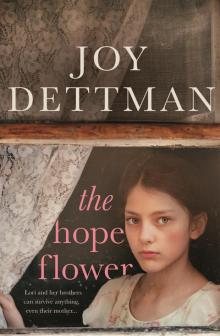 The Hope Flower
The Hope Flower Trails in the Dust
Trails in the Dust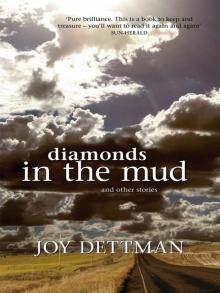 Diamonds in the Mud and Other Stories
Diamonds in the Mud and Other Stories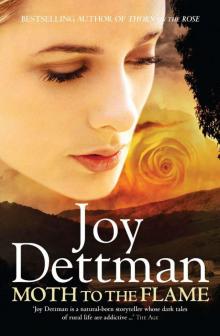 Moth to the Flame
Moth to the Flame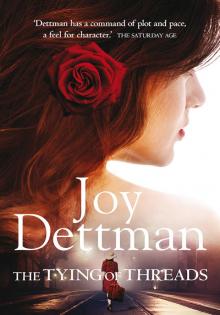 The Tying of Threads
The Tying of Threads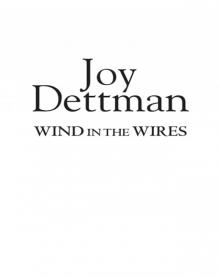 Wind in the Wires
Wind in the Wires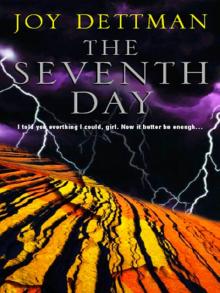 The Seventh Day
The Seventh Day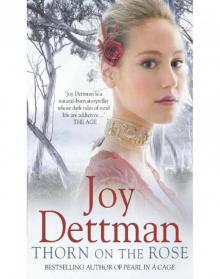 Thorn on the Rose
Thorn on the Rose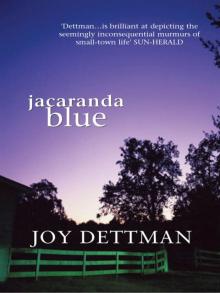 Jacaranda Blue
Jacaranda Blue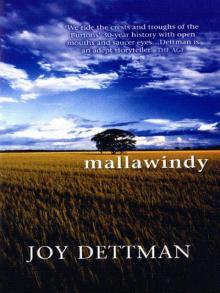 Mallawindy
Mallawindy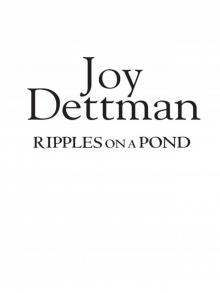 Ripples on a Pond
Ripples on a Pond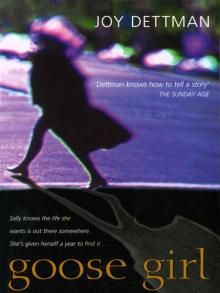 Goose Girl
Goose Girl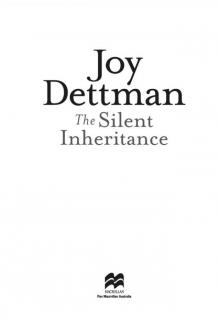 The Silent Inheritance
The Silent Inheritance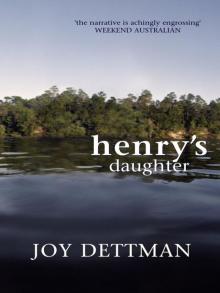 Henry’s Daughter
Henry’s Daughter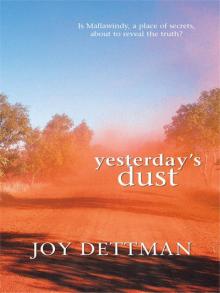 Yesterday's Dust
Yesterday's Dust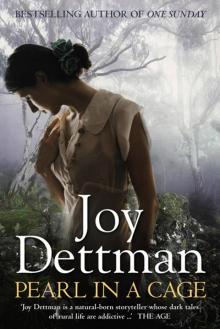 Pearl in a Cage
Pearl in a Cage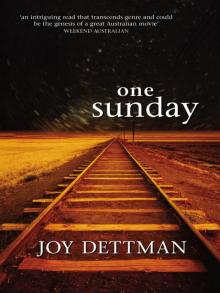 One Sunday
One Sunday